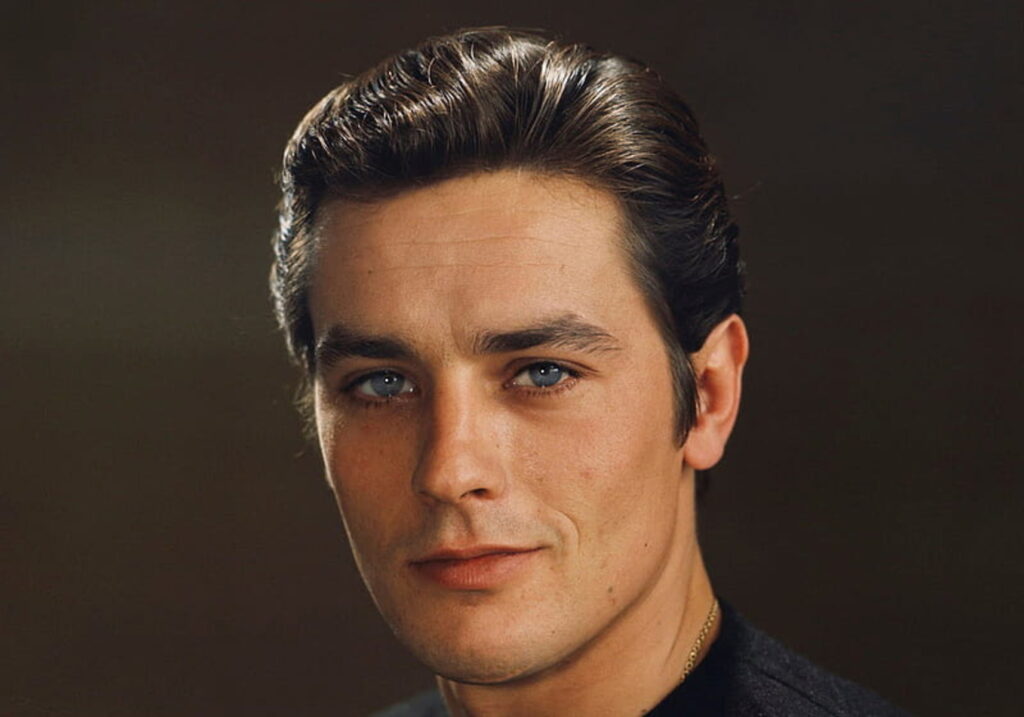
Alain Delon, the French cinema icon who recently passed away, was more than just an actor; he was a symbol of an era, embodying the allure and complexity that defined the golden age of European cinema. Over a career that spanned five decades and more than 100 films, Delon captivated audiences worldwide with a unique blend of beauty, intensity, and a cool, detached persona that made him one of the most unforgettable figures in film history.
In the 1960s, Alain Delon was more than just a leading man—he was the epitome of masculine beauty. With his striking blue eyes, chiseled cheekbones, and athletic build, Delon represented an ideal that was unattainable for most yet admired by all. His appeal went beyond mere physical attributes; it was his enigmatic presence and subtle performances that set him apart. As Jane Fonda, who co-starred with him in 1964’s Joy House, once said, Delon was “the most beautiful human being,” capturing the essence of his magnetic allure.
Delon’s rise to stardom was swift. In 1960, his role in René Clément’s Plein Soleil (Purple Noon), where he played the charming yet sinister Tom Ripley, marked the beginning of a transformative decade. The picture was the first feature film adaptation of Patricia Highsmith’s novel The Talented Mr. Ripley. This period saw him become the face of European cinema, with roles that ranged from the tortured souls in Luchino Visconti’s Dostoyevski inspired Rocco and His Brothers to the detached, stoic figure in Michelangelo Antonioni’s cinematic essay on alienation L’eclisse. These performances highlighted Delon’s versatility, demonstrating that his appeal was not just skin-deep but rooted in profound emotional depth.
Delon’s entry into the world of acting was as unconventional as it was serendipitous. Discovered by Brigitte Auber, a young French actress, while wandering drunk on a Parisian bridge, Delon’s good looks quickly propelled him into the limelight. He soon found himself at the Cannes Film Festival in 1957, where his striking appearance and natural charm opened doors to the film industry. Within a year, he was starring opposite Romy Schneider in Christine, where his princely demeanor and sharp features captured the attention of audiences and directors alike.
One such director was Luchino Visconti, who recognized Delon’s potential to embody both the rugged and refined aspects of his characters. Visconti cast him in Rocco and His Brothers and later in The Leopard, roles that allowed Delon to showcase his ability to portray complex, multifaceted characters. These early performances were marked by a raw, unpredictable energy that made Delon both dangerous and seductive, traits that he would later refine as his career progressed.
For Delon, his career was deeply intertwined with his love life. He once said, “I had never dreamed of being an actor. I started acting and continued to act due to women and for women.” This candid admission reflects the profound impact that love and relationships had on his life choices and career trajectory. Delon believed that love was a driving force in his life, pushing him to achieve more and reach greater heights in his work. “Love has always pushed me to go further,” he confessed, highlighting the central role that romance played in shaping his destiny.
As Delon’s career advanced, so did his acting style. Moving away from the raw intensity of his early roles, Delon developed a more controlled, enigmatic presence on screen. This evolution is evident when comparing his performance in 1964’s The Black Tulip with his later roles, such as his portrayal of Zorro. Delon consciously chose to downplay his pretty-boy image, focusing instead on honing a minimalist approach that emphasized his emotional restraint and quiet intensity.
Delon’s decision to remain within European cinema, despite opportunities to cross over into Hollywood, was a strategic one. It allowed him to maintain his artistic integrity and avoid the typecasting that often befell foreign actors in American films. His collaborations with directors like Jean-Pierre Melville were particularly significant. In Melville’s Le Samouraï (1967), Delon delivered what is arguably his most iconic performance. As Jef Costello, a stoic hitman, Delon embodied a character defined by meticulous precision and emotional detachment. His portrayal was so powerful that it influenced a generation of actors, including Hollywood stars like Clint Eastwood and Steve McQueen, who adopted a similarly minimalist style in their own work.
Reflecting on his life, Delon once remarked, “If I should die tomorrow, may God make it from love… I want people to say of me: ‘He suffered often, he sometimes made mistakes, but he loved.'” This poignant statement captures the essence of Delon’s life philosophy—a man who embraced love fully, with all its joys and sorrows, and who ultimately wanted to be remembered for his capacity to love deeply.
Alain Delon’s legacy is one of timeless appeal and profound influence. His work in films like Purple Noon, Le Samouraï, and La Piscine has left an indelible mark on cinema, making him a figure who transcends time and geography. Even as his career progressed and his looks began to fade, Delon remained a commanding presence on screen, beloved by audiences in France and beyond.
One of his most memorable later appearances was in the comedy film Asterix at the Olympic Games in 2008, where Delon played Julius Caesar.
As he once reflected, Delon never set out to be an actor. Yet, his journey from an aimless young man to a global cinema icon is a testament to his undeniable talent and charisma. Through his work, Delon has secured a place in the pantheon of great actors, a place where his image will forever smolder, eternally youthful and enigmatic, in the annals of film history.
